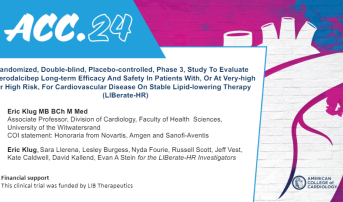NOW PUBLISHED - LIBerate-HR: Lerodalcibep Lowers LDL More Sharply Than Placebo Over 1 Year
(NOW PUBLISHED) The novel agent has shown no immunogenicity issues thus far and might be a promising new PCSK9 inhibitor option.

TCTMD reported in-depth on the LIBerate-HR trial April 12, 2024, following its presentation at the American College of Cardiology (ACC) 2024 Scientific Session. The full manuscript was subsequently published in JAMA Cardiology on July 3, 2024 and the published results closely match the presentation. Find our full coverage below. |
ATLANTA, GA—The third-generation PCSK9 inhibitor lerodalcibep (LIB Therapeutics) can reduce LDL-cholesterol levels by 56% more than placebo over the course of a year in patients with or at very high risk for CVD, according to new randomized data.
Additionally, investigators report there were no safety, tolerability, or immunogenicity issues seen compared with placebo.
“Lerodalcibep offers a novel, effective alternative to existing PCSK9 inhibitors,” said Eric Klug, MBBCh (University of the Witwatersrand, Johannesburg, South Africa), who presented the LIBerate-HR findings at the American College of Cardiology (ACC) 2024 Scientific Session.
“There's a substantial LDL-cholesterol reduction on top of existing oral agents,” he told meeting attendees. There’s an ability for more than 90% of patients to achieve the new [European Society of Cardiology] guideline targets with robust reductions in all atherogenic lipids and lipoproteins.”
Previous findings with the investigational agent showed a 9.26% reduction in LDL-cholesterol levels in patients with homozygous familial hypercholesterolemia over 24 weeks, but the results were in line with what has already been seen with evolocumab (Repatha; Amgen) in this population.
Consisting of adnectin, an anti-PCSK9 target-binding protein, and human serum albumin, lerodalcibep blocks PCSK9 from binding to LDL cholesterol, thereby preventing degradation of the LDL receptors and enhancing cholesterol clearance. It differs from the currently available monoclonal antibodies in that its smaller and highly soluble, which allows for a substantially smaller injection volume (1.2 mL subcutaneously). In phase II studies, a monthly 300-mg dose reduced LDL cholesterol by as much as 70%.
The current study indicates that lerodalcibep could be an “option for anyone who needs a PCSK9 inhibitor,” Christie Ballantyne, MD (Baylor College of Medicine, Houston, TX), told TCTMD. The fact that it requires only a small injection once a month is “a little bit of an advantage over the monoclonals,” which generally require injections every 2 weeks, he said.
For commercial approval, Ballantyne continued, the question is whether there are enough safety data.
“It looks like so far they haven't seen safety signals [and] that they could have an approval of their phase III program for a lipid-lowering indication,” he said. “They don't have an outcomes study, but we don't have the outcomes on inclisiran either and the monoclonals were also approved before they had outcomes.”
But with all of these drugs, the major issue has been access and hurdling through the tough prior-authorization process. “It would be wonderful . . . if we’re able to somehow make it so that we can easily prescribe these drugs to the patients that need them and that the patients can get the medications without so many steps and so much hassle,” Ballantyne said during the session. “I hope that the future will allow us to use these drugs much more easily. There have been improvements, but it’s still a pain.”
Halving of LDL
For the phase III LIBerate-HR study, Klug and colleagues included 922 patients (mean age 64.5 years; 46% female) with or at very high risk of CVD from 11 countries. They were randomized in a 2:1 fashion to receive monthly injections of subcutaneous lerodalcibep 300 mg or placebo for 52 weeks. At baseline, more than 80% of patients were on statins, including more than two-thirds on high-intensity statins, and 16.6% were taking ezetimibe. Baseline LDL cholesterol was 116 mg/dL.
At week 52, those in the lerodalcibep group had a 56.19% greater reduction in LDL cholesterol compared with placebo (-56.33 vs -0.14%; P < 0.001). Overall, 94% of patients taking lerodalcibep achieved at least a 50% reduction in LDL cholesterol after 1 year, compared with only 19% of placebo-treated patients.
Additionally, lerodalcibep was associated with drops in non-HDL cholesterol (-47.3%), apolipoprotein B (-43%), Lp(a) (-33.4%), and triglycerides (-16.5%) as well as a 6.5% increase in HDL cholesterol. The mean and median change in free PCSK9 among those in the study arm at 52 weeks were -75% and -96%, respectively.
Safety was good, with a similar number of patients in the lerodalcibep and placebo groups reporting an event leading to drug withdrawal (4.2% vs 4.6%), a serious adverse event (12.4% vs 13.4%), cardiovascular death (5.7% vs 7.8%), MI (0.8% vs 2.6%), and stroke (0.2% vs 1.0%). Injection-site reactions were more common with lerodalcibep (6.9% vs 0.3%), but they were considered “mild to moderate,” said Klug.
Klug said there were no issues with immunogenicity.
Speaking during the session, Ballantyne brought up the failed PCSK9 inhibitor bococizumab, which manufacturer Pfizer stopped researching once problems with immunogenicity arose. “We remember the story of bococizumab, which was a humanized monoclonal and it turns out that humanized monoclonals aren't the same as a fully human monoclonal antibody,” he said.
To TCTMD, Ballantyne said more data from the lerodalcibep program as a whole are needed before ruling out issues of this kind. “This one study, in itself, it's encouraging, but we need to look at the whole program,” he said. “With repeated injections, you might see something after a year or 2 years as you [treat] more patients.”
Yael L. Maxwell is Senior Medical Journalist for TCTMD and Section Editor of TCTMD's Fellows Forum. She served as the inaugural…
Read Full BioSources
Klug E. Randomized, double-blind, placebo-controlled, phase 3, study to evaluate lerodalcibep long-term efficacy and safety in patients with, or at very-high or high risk, for cardiovascular disease on stable lipid-lowering therapy (LIBerate-HR). Presented at: ACC 2024. April 7, 2024. Atlanta, GA.
Disclosures
- Klug reports receiving honoraria from Novartis, Amgen, and Sanofi-Aventis.
- Ballantyne reports receiving research funding from and serving as a consultant for Amgen, Novartis, and Merck.






Comments